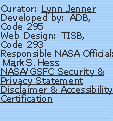|
|
 |  |
 |
 |
|
This
concludes Science Question of the Week for this school year. Tune
back in after the summer in September for another year of great
questions and answers.
Have
a terrific and safe summer 2006!
|
 |
- What
does inflation have to do with the early Universe?
(26 May 2006)
- Name
at least 2 reasons why there's so much more sediment in the Chesapeake
Bay today than 200 years ago? (19
May 2006)
- What
is a starburst galaxy?
(12 May 2006)
- In
order to cast a shadow on the Earth' surface after sundown, how
bright must a celestial object appear -- as bright as the full
Moon, the 1/4 Moon, Jupiter? Which 2 or 3 objects qualify as shadow
makers? (07 April 2006)
- Arthur
C. Clark and Robert Forward wrote science fiction stories about
solar sails, spacecraft that require no fuel to move around in
interplanetary space. NASA is working on a flight demonstration
of such solar sail crafts. Since they have no fuel on board, what
propels these solar sail crafts, the solar wind, solar storms,
or Sun light?
(24 March 2006)
- On
average, approximately how many days per year is the temperature
at the North Pole colder than at the South Pole; 200, 160, 120,
80, 40? How many days per year is the North Pole temperature colder
than Vostok, Station, Antarctica?
(10 March 2006)
- What
do a NASA engineer and a police detective have in common?
(03 March 2006)
- Where
would you go to find the largest known lightning storms?
(24 February 2006)
- Is
there any difference between natural and man-made snow? If there
is, what is it and what impact does it have on winter athletes?
(17 February 2006)
- What
is a sundog? Are they just another rainbow? (10
February 2006)
- Do
the dates for the latest sunrise and earliest sunset during the
winter occur at nearly the same time for all latitudes? (03
February 2006)
- How
close can you get to a black hole without falling in?
(27
January 2006)
- How
has the Rossi X-ray Timing Explorer helped us to see the difference
between neutron stars and black holes? (20 January
2006)
- What
does it mean when a hurricane name is "retired?"
(13 January 2006)
- We
get to experience (sort of) two of these in the night sky this
month -- we've already had one. What are they?
(16 December 2005)
- What
is UTC ? How do I tell at what time a satellite picture was taken?
(09 December 2005)
- What
is an Einstein ring?
(02 December 2005)
- What
was the "Little Ice Age?"
(28 November 2005)
- What
did the first stars look like?
(14 November 2005)
- This
has been a remarkable hurricane season indeed! Not only have several
extremely damaging hurricanes pummeled the U.S., Central America
and Caribbean nations, but for the first time ever, we've run
out of proper names for these storms. However, perhaps the most
curious hurricane of 2005 is one that received little attention.
Any idea as to which one?
(November
4, 2005)
- When
Deep Impact’s probe crashed into Comet Tempel 1 on July 4,
how big a crater did it leave? (October 28,
2005)
- Why
are tropical cyclones (Tropical Depressions, Storms, Hurricanes
and Typhoons) named?
(21 October 2005)
- What
is "space weather", and why should I care?
(14 October 2005)
- What
are the most distant objects seen in the Universe? (07 October
2005)
- A
popular movie this past summer, March of the Penguins, mentions
that Antarctica is the coldest, driest, windiest, darkest, and
highest continent. Which of the these adjectives is incorrect?(30
September 2005)
- Has
a tenth planet really been found? (23 September 2005)
-
Because the world, planets, stars and so much that NASA surveys
is in constant motion, it's important to know the laws. Sir Isaac
Newton wrote the 3 laws of motion can you name them? (16 Sept
2005)
Previous
Years Questions:
[1995]
[1996]
[1997]
[1998]
[1999]
[2000]
[2001]
[2002]
[2003]
[2004] | |




